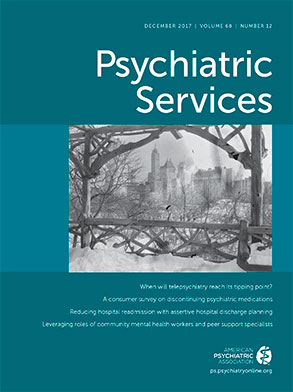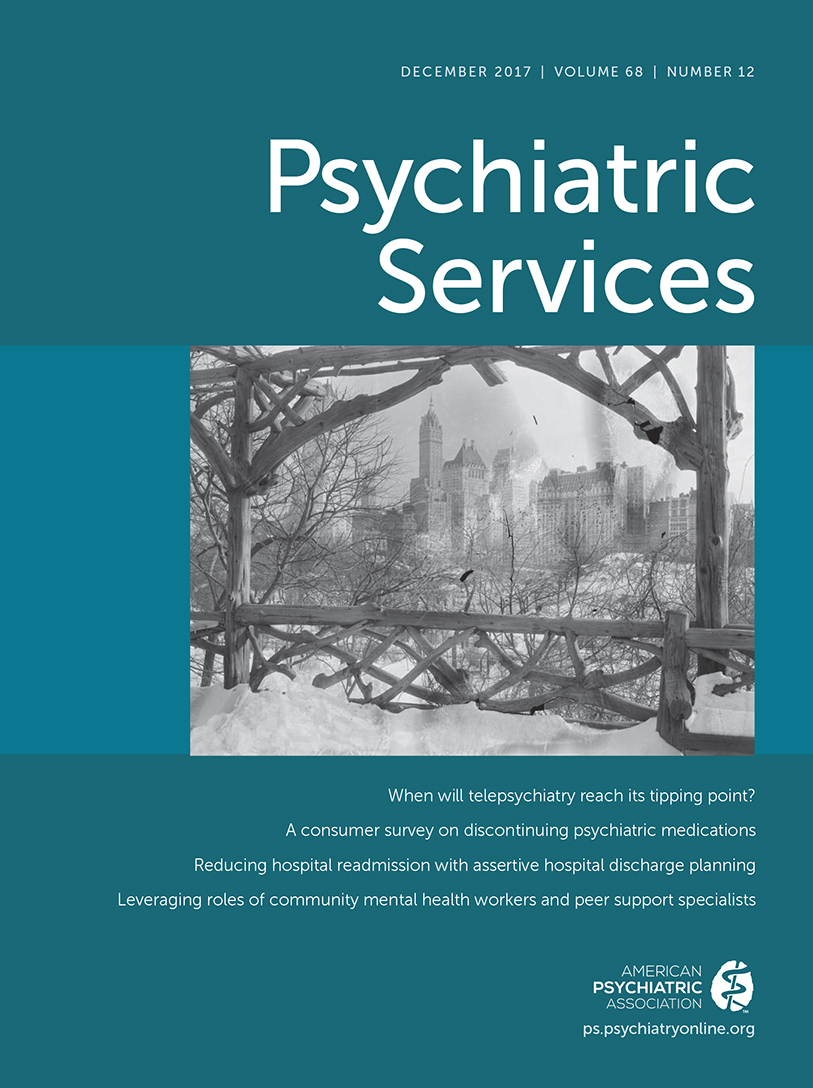In published work, little distinction has been made between two peer workforces: community health workers (CHWs), who are deployed by the general medical care system, and peer support specialists (PSSs), who are deployed by the behavioral health care system. Service roles of each are separately defined by the system that deploys them. Both workforces have been shown to produce effective and positive outcomes for those they serve (
1,
2). Assimilating the CHW and PSS workforces into integrated systems of care requires a better understanding of their different roles and unique contributions to supporting patient engagement (connecting patients with health resources), promoting activation (helping patients to assume responsibility for improved self-care), and fostering wellness (improving health outcomes).
In deploying the CHW and PSS workforces, a central question is whether each represents distinct service roles and unique aspects of peer status. Or, do the services provided by these workforces reflect a continuum of peer status that can and should be deployed across all health care systems? Determining the core elements of peer status will help better define and differentiate these roles.
Traditionally, CHWs share a community and a sociocultural sense of peer status with the persons they serve and have been described as cultural peers. A recent study of the characteristics that CHWs share with the communities they serve found that the predominant characteristics included racial and ethnic similarities (shared by 74% of the peer sample with their community), cultural similarities (55%), and living in the same community (53%) (
3). Less common characteristics included similar life situations (39%) and shared health conditions (27%).
PSSs share a peer status with those they serve that is based on their experience living with an illness or health condition and promoting wellness and recovery. According to the Center for Integrated Health Solutions, “A peer provider (e.g., certified peer specialist, peer support specialist, recovery coach) is a person who uses their lived experience of recovery from mental illness and/or addiction, plus skills learned in formal training, to deliver services in behavioral health settings to promote mind-body recovery and resiliency” (
4). A review of PSS roles described their core attributes as sharing personal illness and recovery experiences, encouraging self-determination and personal responsibility, promoting hope, improving health and wellness self-management through assistance communicating with providers, and combating stigma (
5). Fidelity measures of the distinct services provided by the PSS workforce are emerging, and factors that support or hamper performance can be identified (
6). Greater attention to the specific roles and services provided by PSSs and CHWs promotes better standardization for each workforce and allows for improved evaluation of their effectiveness and outcomes.
Key Roles and Core Competencies of the CHW and PSS Workforces
As defined in the Affordable Care Act, a CHW is as an individual based in the community who promotes health or nutrition through liaison activities between health care agencies and the community, provides social assistance and guidance to community residents, enhances communications between residents and health care providers, provides health and nutritional education that is culturally and linguistically appropriate, supports referral and follow-up services, and proactively identifies and advocates for the enrollment of eligible individuals in covered health service programs (
7). Some states have established CHW competencies, or specific skill sets that guide these roles. Specifically, the Minnesota Community Health Worker Alliance cites five core role functions: providing culturally appropriate community-based outreach, health information, and education; culturally mediating and bridging between individuals, communities, and health and human services; ensuring that people access needed services; providing social support, informal counseling, care coordination, and health screenings; and advocating for the needs of individuals and communities (
8).
The Substance Abuse and Mental Health Services Administration describes the PSS as engaging in a range of role activities, including mentoring and advocacy, resource linkage and coordination, community and relationship development, goal setting and skill building, and sharing experiences of living with behavioral health conditions. Key elements of competencies or skill sets include a recovery orientation and services that are person centered, voluntary, relationship focused, and trauma informed (
9). A national certification has been established for PSSs (
10). Certification documents describe PSSs as using “their lived experience and learned knowledge and skills to help others engage in self-directed recovery planning and develop the skills necessary to activate self-management of their primary disease(s) and/or prevent the escalation of illness.”
When Peer Status Is a Factor
A key difference between the CHW and PSS workforces is the way in which they connect with the individuals they serve. The CHW often shares a social and a cultural background with those served; the shared background is based in common community experiences and shared institutional affiliations, including churches, schools, and other organizations. The PSS draws on some of the same community life–based experiences and also uses his or her own lived experiences with behavioral and other health conditions to support engagement, recovery, and improved health activation. This shared experience with common health conditions fosters support and activation through a peer wellness–based approach that has been credited with the promotion of hope and the belief that recovery is possible for those with behavioral health conditions (
11). Both CHW and PSS roles foster improved understanding of existing health conditions and treatment alternatives, which are core tenets of health literacy.
CHWs and PSSs use different types of shared peer status to connect with the persons they serve. A key workforce challenge is to identify when and how these specific elements of peer status, or “peerness,” make a significant difference in health care engagement, activation, and health outcomes. Consideration must be given to the skill sets or competencies used by both workforces to better understand whether each workforce has a unique peer status or whether the elements of peer status, along with the roles undertaken and services provided, are shared by and interchangeable between the two workforces.
For individuals with chronic general medical conditions or limited health care engagement, affiliations promoted by the CHW workforce through social and cultural community-based support foster effective treatment seeking and improved health care engagement. Individuals with behavioral health conditions or complex illnesses, such as serious mental illness, certain cancers, and other traumatic or life threatening illnesses (
2,
12–
14), can experience risks to their personal well-being and resiliency, social stigma and self-stigma or disenfranchisement, and shame. Supportive connections with PSSs who have had similar life experiences and health conditions foster the development of hope, resiliency, activation, and effective recovery skills.
Which Workforce to Use When—and Why
Both CHWs and PSSs are emerging workforces. Each has varying requirements and regulations for training, certification, reimbursement, and deployment, which vary by state and funding sources. The extent to which the two workforces share common roles, skills, or competencies has not been formally established. As a result, there is a lack of consensus about whether their roles are different, the same, or perhaps an extension of one another. This lack of standardization fosters continued confusion and uncertainty about how to best deploy these resources in integrated systems of care.
CHWs are effective in promoting outreach, education, and health care engagement in the communities where they live (
1). Peer specialists are effective in fostering hope and supporting individuals to find and use activation tools and resources to support self-care, shared decision making, and adherence to treatment plans (
11). PSSs appear to be most effective when the patient has a more severe illness or a high level of hopelessness and disenfranchisement, and the PSS can use his or her lived experiences to promote activation and recovery.
A range of peer roles for the CHW and PSS workforce include providing education and connection to treatment services; prevention to avoid illness; addressing hopelessness and trauma of illness conditions; activation to support wellness, health improvement, and recovery; and promoting self-care, shared decision making, and care plan adherence. CHWs tend to have the highest level of peer activity roles in the areas of outreach, education, and engagement with health services. PSSs have the highest level of peer activity roles in addressing the hopelessness and trauma of health conditions and promoting activation for recovery and resiliency. [A conceptual framework of the different roles played by CHWs and PSSs, as described by the frequency of services they provide—from low to high—is available as an online supplement to this article.] This framework is proposed to help guide clinical systems in their deployment of these peer roles.
This framework suggests that CHWs have a primary role that promotes outreach, education, and engagement for individuals with chronic health conditions. Often this role is specific to a defined illness, such as diabetes or hypertension, and the goal is to support healthy communities as individuals seek early diagnosis and treatment. Also, as the framework illustrates, PSSs generally focus on supporting recovery by using their lived experiences with a health condition to build trust, foster hope, and provide a range of activation tools and strategies that support the individual. PSSs utilizes both their training and their lived experiences to foster activation and recovery among persons living with similar health conditions. This work supports engagement with treatment teams and self-activation to achieve individual wellness and recovery goals. This proposed framework can help guide and direct the deployment of the CHW and PSS workforces in integrated systems of care.
Implementing Both CHW and PSS Roles
Both the CHW and PSS workforces are important additions to integrated care teams. Peer status involves a continuum of attributes and affinities, including shared ethnic, racial, and cultural similarities; residence in the same communities; common life situations; and shared health conditions. A savvy system of care can use the framework presented here to recognize the different attributes of “peerness” and deploy both CHWs and PSSs in a targeted manner to support individuals to become better engaged to seek treatment, become more activated in their own care, and achieve improved health outcomes.

